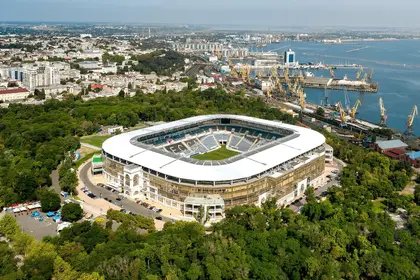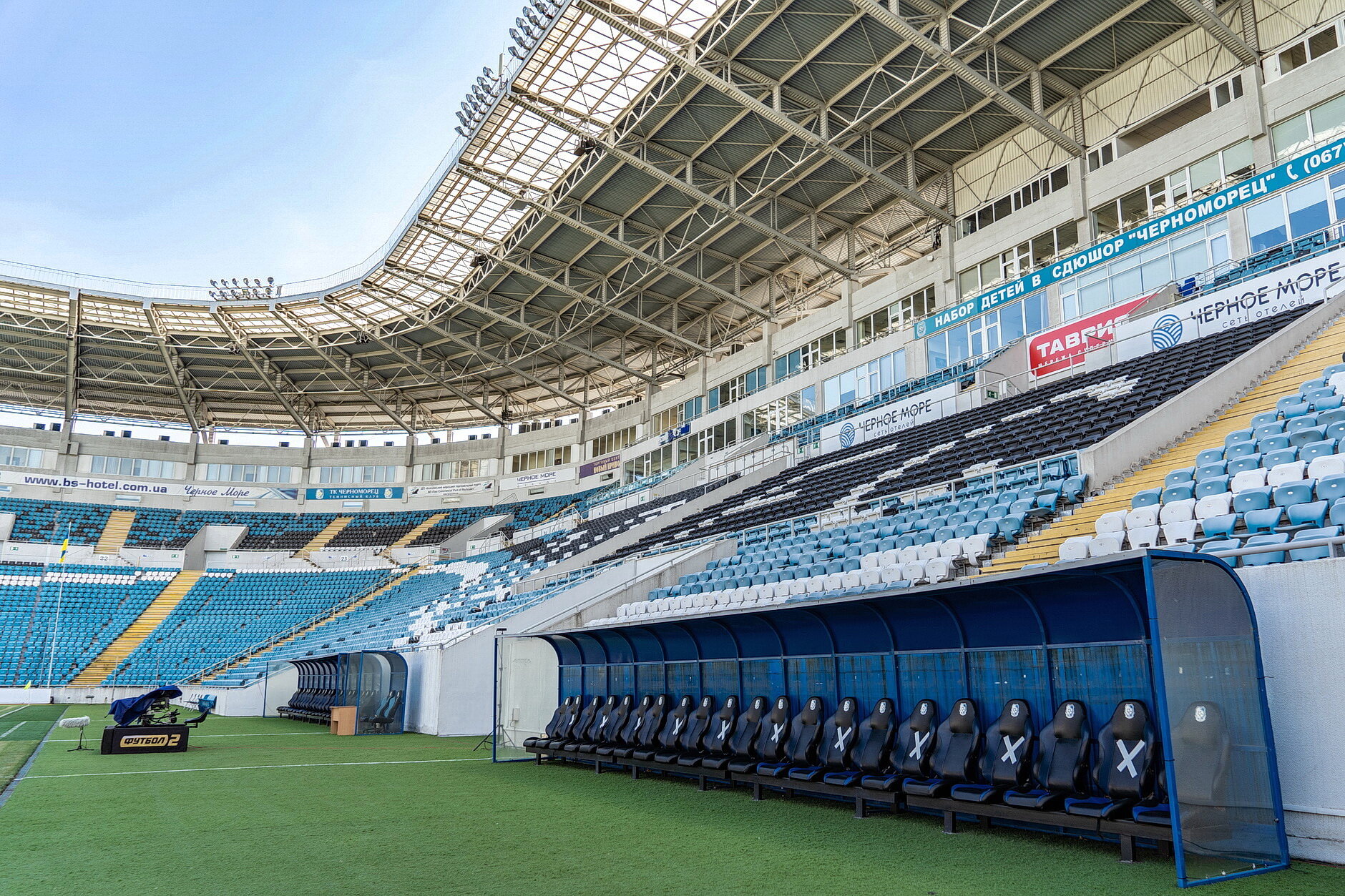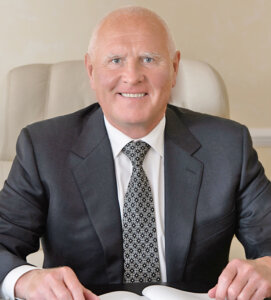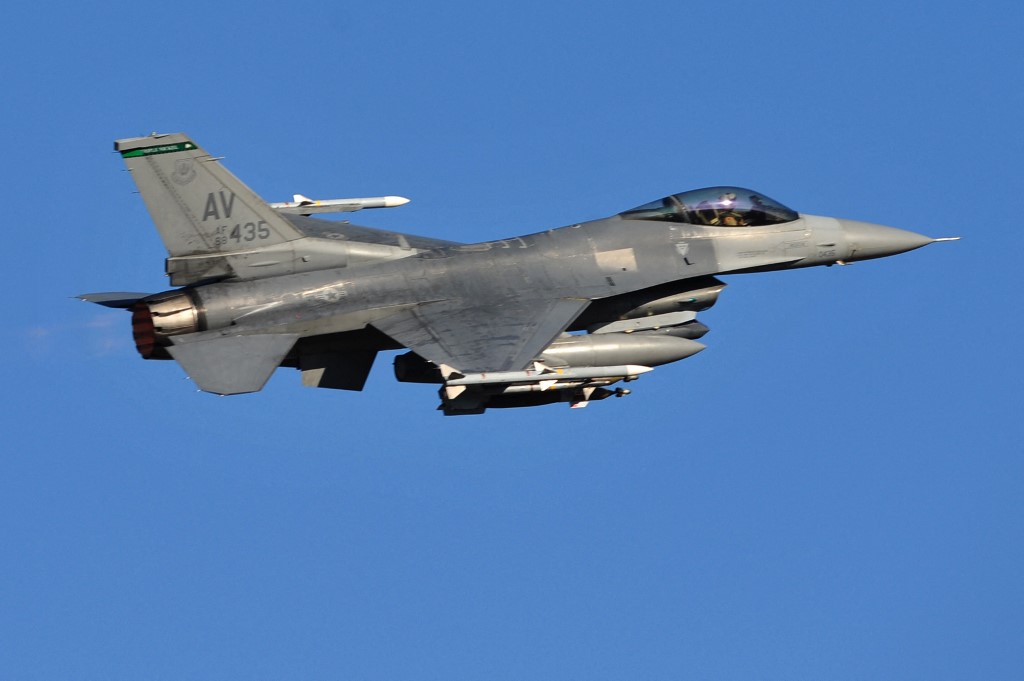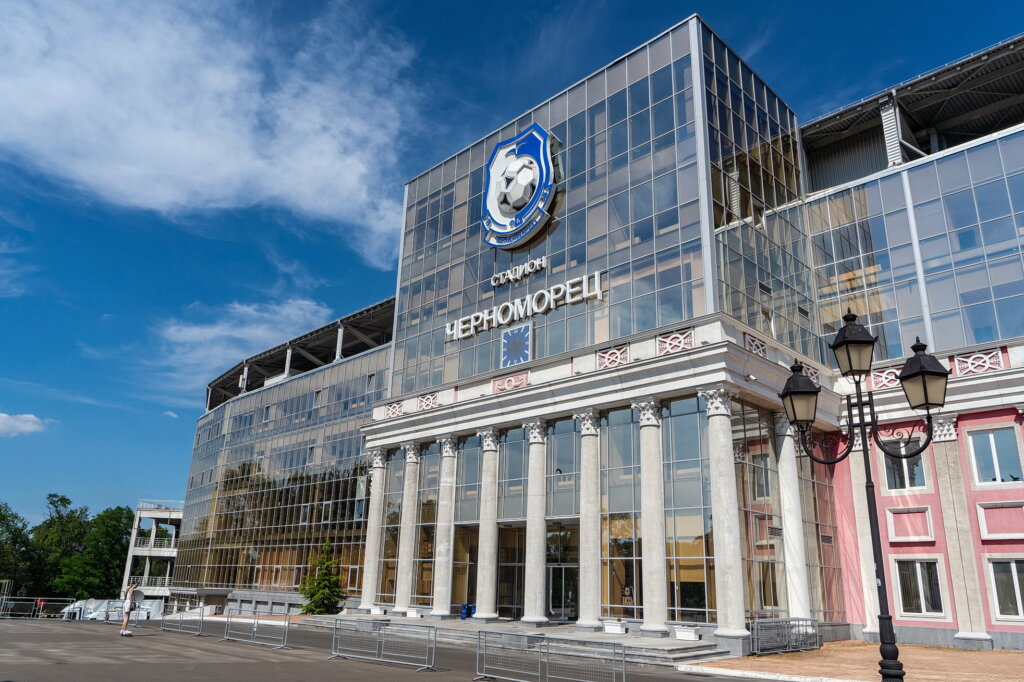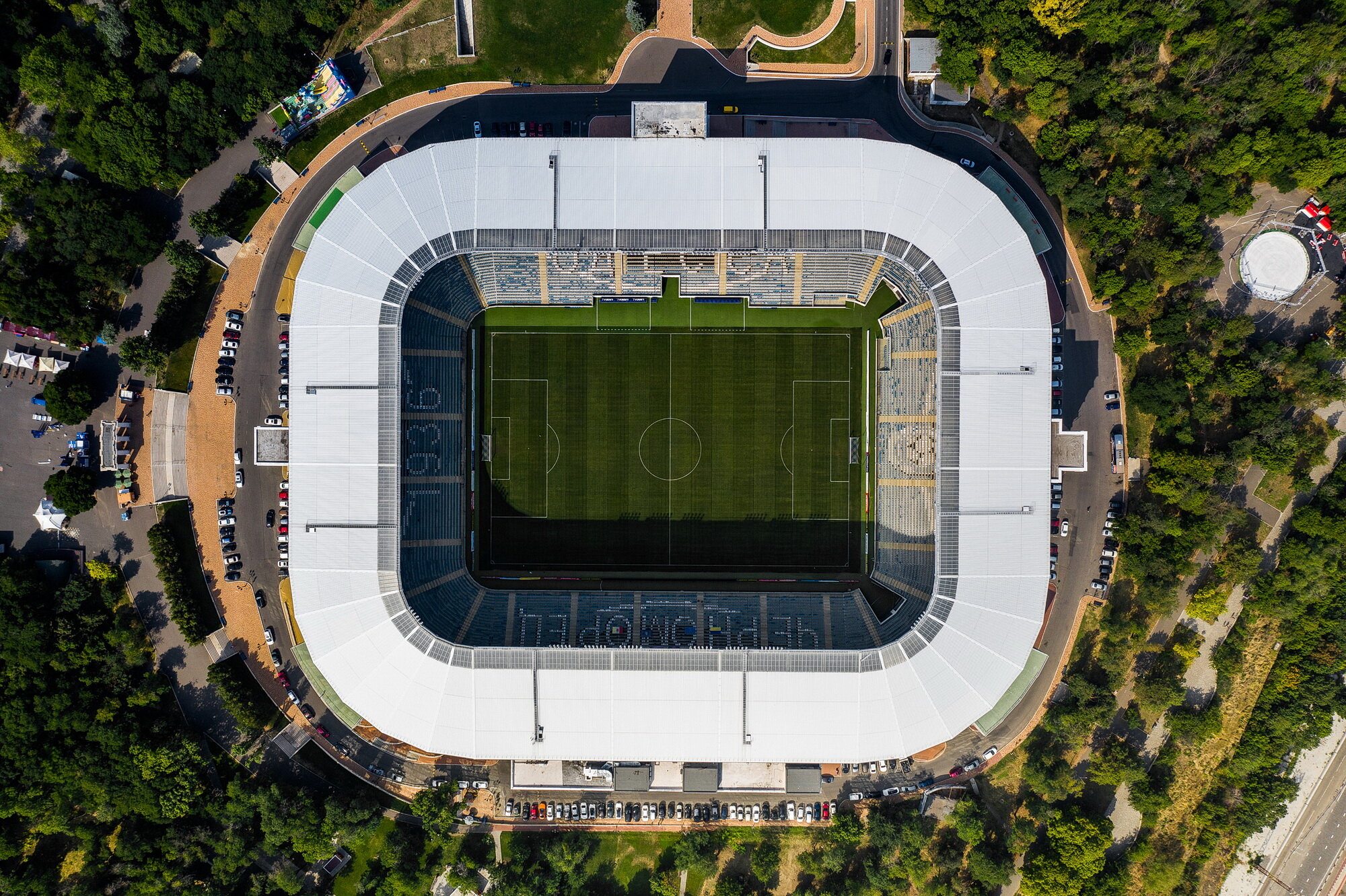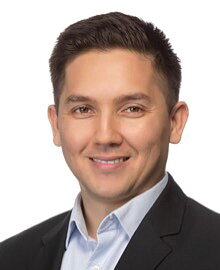ODESA, Ukraine – Allrise Capital, a U.S. investment fund, on July 21 closed a landmark deal to buy Odesa’s Chornomorets soccer stadium.
In theory, this could be one of the sexiest assets put up for sale in Ukraine: the stadium complex comes with a hotel, shopping center, business offices, restaurant, and a fitness center. All of them are supposed to generate a lot of revenue.
JOIN US ON TELEGRAM
Follow our coverage of the war on the @Kyivpost_official.
But it’s not that easy. The Chornomorets complex has a lot of legal issues and a shady ownership history.
The buyers of the stadium were warned that purchasing it would be “a ticket to war.”
First, they would have to wrest control of the asset away from Leonid Klimov, a former ally of ex-President Viktor Yanukovych who cost taxpayers at least $165 million after his Imexbank was declared insolvent in 2015 after a raft of alleged bank fraud.
After multiple failed auction attempts and unrealistic hopes of attracting $29 million for the property, the state accepted Allrise Capital’s $7.3 million bid in May.
After the auction, Klimov continued to operate the property, even though the Ukrainian Supreme Court had ruled he had no ownership rights.
After Allrise Capital’s winning bid, Kyiv prosecutors successfully sought Kyiv’s Shevchenkivsky court ruling to hold up the sale and seize the assets – preventing the fund from closing on the sale and acquiring the property.
It was “a clear case of corruption by the prosecutor’s office and the Shevchenkivsky district judge,” Russian-American Ruslan Zinurov, CEO of Allrise Capital, told the Kyiv Post. “Our legal team is fighting. It came up a few days prior to the closing and was aimed to stall the transaction. It was undoubtedly funded by opponents.”
Allrise quickly got that order canceled.
Now all that remains is for the new investors is to regain control of the property from Klimov.
Zinurov told the Kyiv Post that Allrise will eventually succeed in removing Klimov’s control by enforcing court judgments, but it could take a while. The fact that Klimov is clinging to the property is an indication of its profitability.
Zinurov presents himself as a white-knight investor bringing foreign money into Ukraine and saving the asset.
But skeptics claim that it would not make much sense for a genuine foreign investor to buy such a troubled asset and, in the Black City port city that is home to 1 million people, suspicions are high that Allrise Capital is an elegant front for Klimov, a form of ownership “laundering.”
Zinurov has denied such accusations unequivocally and categorically.
But the complicated Choronomorets sale saga highlights why foreign investors shy away from Ukraine. The stadium was put up for sale as a result of Ukraine’s $20 billion banking fraud scandal of the last decade, an orgy of lending that went unpunished and for which the state has recovered very little for taxpayers.
Stadium
The Chornomorets stadium hosts Odesa’s leading soccer team, Chornomorets. The team, however, was not sold along with the stadium and still belongs to Klimov.
Although the stadium was built in 1925, it was rebuilt in 2008 to 2011. Now it imitates the neoclassical 19th-century architecture characteristic of Odesa.
The complex includes a hotel, office space, a shopping mall, and a fitness center equipped with a swimming pool, hamam and a Russian bath. The hotel has a good view of the sea and is a 10-minute walk from Odesa’s Lanzheron beach.
The sale of the stadium was conducted by U. S.-based First Financial Network (FFN), an international loan and REO sale advisor with 30 years of experience in asset sales conducted in over 30 countries. FFN is an advisor to Ukraine’s Deposit Guarantee Fund and the National Bank of Ukraine and has been an advisor to many foreign central banks and related entities, currently all of the top U.S. banks, FDIC, Fannie Mae, Freddie Mac, and numerous other institutions and has worked with the IMF, World Bank and U.S. Treasury in several countries.
“This transaction aligns with one of Ukraine’s primary economic goals of attracting direct foreign investment and demonstrates the nation’s ability to sell assets to the international community,” said John Morris, president of First Financial Network. “We have been working diligently on behalf of our clients in the region, the Deposit Guarantee Fund and the National Bank of Ukraine, to build momentum and interest in Ukraine investment opportunities. The NPLs (non-performing loans) and real estate properties have been sold through our extensive marketing and due diligence efforts and the proven success of our secure online sales platform.”
Klimov’s clout
Klimov had been entrenched as a member of parliament from Odesa Oblast’s Kotovsk District, later renamed to Podilsk District, since 2002. The first time he lost in the district was in 2019, when he was defeated by Oleksiy Honcharenko from ex-President Petro Poroshenko’s European Solidarity party.
The peak of his political and business clout was when he was the head of ex-President Viktor Yanukovych’s Party of Regions branch in Odesa Oblast and an aide to Yanukovych in the 2000s.
During that period, Klimov received huge pieces of land from the city council – in a way similar to land currently being awarded to companies allegedly linked to businessman Vladimir Galanternik, an ally of incumbent Odesa Mayor Gennady Trukhanov.
At the same time, public sector workers’ funds were channeled to deposits at Klimov’s Imexbank.
Imexbank bankruptcy
The stadium was sold as part of Imexbank’s bankruptcy proceedings. Thousands of depositors were deprived of their money when the bank went bankrupt in 2015.
They have accused the bank of defrauding them. The bank’s money could have been given to the depositors but the funds have been channeled out of the bank as loans to firms allegedly controlled by Klimov.
Yuriy Gramatik, former CEO of Imexbank, has been charged with embezzlement at the bank and is currently wanted. According to the investigators, Klimov’s group embezzled Hr 19 billion by disbursing insider loans to firms controlled by Klimov.
Klimov’s son-in-law Oleksandr Kryzhanovsky, also a city council member, has also been charged with embezzling $31 million. Kryzhanovsky and Gramatik could not be reached for comment.
The criminal case has made no progress, and the key alleged accomplices who could have testified against Klimov have fled. Despite having been the owner, Klimov himself has not been charged with anything.
Several Klimov assets frozen as part of the criminal case have been transferred to firms controlled by Vasyl Shkryabay, a city councilor from Trukhanov’s party. Shkryabai did not respond to a request for comment.
Residents of Karolino-Bugaz, a Black Sea resort in Odesa Oblast, have also accused Klimov’s Imexbank of defrauding them. They have bought about 20 luxury apartments in the resort, but it later turned out that they were used as collateral for a loan provided by Imexbank to a firm called Veteran.
The Chornomorets stadium was the guarantor for the loan deal, and its assets also became collateral. Currently, the apartments’ owners are facing debt claims from Imexbank, and the state Asset Recovery Management Agency (ARMA) is seeking to seize their apartments.
Milking the asset
Before the deal was closed, the Choronomorets complex was still de facto controlled by Klimov despite the criminal cases and seizure of assets.
Zinurov said that “the previous ownership group had control of the asset” then and was “still occupying the property.”
“Klimov is not an easy opponent,” he added. “We feel we have the right toolbox to deal with the guy. He’s adamant about not letting it go.”
The Chornomorets stadium’s tenants pay minuscule rent to it, but subtenants pay big rent to the tenants, which are allegedly controlled by Klimov, Mykhailo Shmushkovych, ex-chairman of Odesa Oblast’s legislature, told Channel 7 in June. This allows Klimov to keep milking the stadium, according to Shmushkovych.
Klimov’s continued de facto control over his former assets has also been confirmed by the ARMA. The agency was expected to get control over some of Klimov’s assets, including a store in Odesa, the Black Sea Hotel in the resort of Karolino-Bugaz in Odesa Oblast and 20 apartments in Karolino-Bugaz.
But Andriy Potyomkin, a representative of the ARMA, said in May that Klimov is still getting income from these assets and is preventing the agency from taking over them.
Allrise Capital
Little information can be found on the official site of the stadium’s buyer, Irvine, California-based Allrise Capital, which prompted speculation on whether it was a genuine foreign investor.
When Allrise Capital is googled, almost all of the sites refer to the Chornomorets deal, and nothing is devoted to the firm’s other activities.
“We invest primarily in three asset classes — real estate, technology, and special situations.” Zinurov said. “Most of our exposure in California and Nevada; our team is 12 people; it’s a combination of bankers, lawyers and some specialists in real estate; a couple of years ago we started looking a little closer to Ukraine; liked seeing what is happening in the democratic and social perspectives; we feel like foreign investments can be protected a lot better currently.”
Zinurov is originally from Russia, and Mikhail Trubchik, Allrise Capital’s executive director, also has a Slavic name. This also fueled speculation that some businessmen based in Russia or Ukraine could be behind the U.S. fund.
“I am bilingual,” Zinurov said. “I was born in Russia but I’ve been living in the United States for more than 15 years. My wife is from Ukraine.”
Explanation for the deal
“We found it very attractive and started to follow the asset quite some time ago; the location is fantastic and we became very interested in it,” Zinurov said. “The property is prominent and well-built and has a lot of social importance to the city.”
Zinurov went on to say that Allrise Capital is “fully committed to the complex’s sporting component.”
He admitted, however, that the complex has legal problems.
“We want to make this a case study for foreign investment in Ukraine,” Zinurov added. “This is not the most straightforward investment you can do anywhere in the world; it has a tail of legal issues… The reason why this asset was on the market for such a long time is exactly that it’s not a completely cleaned up asset.”
But he argued the fund was bullish on Ukraine.
“There’s always a risk; but in this particular situation we feel very confident in our strategy and we gave it a lot of thought and analysis before we pulled the trigger on this asset,” Zinurov said. “Not only Ukraine but also Odesa region that has a certain history; in our view, it’s getting better.”
Fronting?
But skeptics in Odesa and elsewhere wondered why a genuine foreign investor would be interested in such a problematic asset.
Shmushkovych, ex-chairman of Odesa Oblast’s legislature, told Channel 7 in June he believes the Chornomorets stadium was purchased by either a group that cooperates with Klimov or a group that is much stronger than Klimov’s.
Oleksandr Orlov, ex-deputy governor of Odesa Oblast, told Channel 7 in June he did not believe Allrise Capital was a genuine U.S. fund. He said that Klimov could have effectively bought the stadium from himself through the U.S. fund.
Oleg Yashchuk, a Ukrainian sports journalist, also claimed on Instagram that Allrise Capital had bought Chornomorets on behalf of Klimov. The Chornomorets team’s fans have announced plans to stage protests due to this.
Meanwhile, sports blogger Anton Terekhov told USI, an Odesa-based news site, that Allrise Capital’s site indicates that it is being used for a shady transaction by Ukrainian businesspeople. He said the purchase could have been made in the interests of oligarch Vadym Novynsky, who has denied this.
Allrise Capital denied the speculation.
“The local community was questioning why a U.S. based investment company would buy such a particular type of asset,” Zinurov said. “There is a lot of speculation that we are fronting someone and are not a real investor or that a local ownership group is standing behind us. Obviously this is not true.”
See also: Odesa’s Chornomorets arena to go to auction for third time
You can also highlight the text and press Ctrl + Enter


